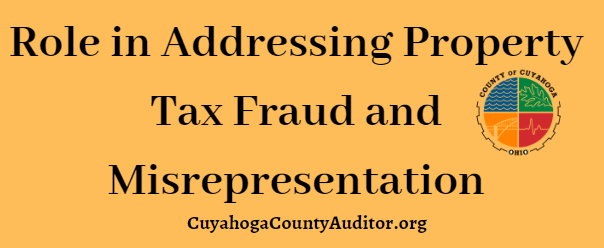Property tax fraud and misrepresentation pose significant challenges to local governments and taxpayers alike. In Cuyahoga County, Ohio, the Auditor’s Office plays a pivotal role in identifying and combating these illicit activities to ensure fair and equitable taxation.
Understanding Property Tax Fraud
Property tax fraud encompasses various deceptive practices, including underreporting property values, claiming unwarranted exemptions, and falsifying ownership information. These actions not only undermine the integrity of the tax system but also deprive communities of essential revenue for public services and infrastructure development.
The Role of Cuyahoga County Auditor
Identifying Fraudulent Activities
The Cuyahoga County Auditor’s Office utilizes data analysis, field inspections, and tip-offs from concerned citizens to identify potential instances of property tax fraud. By scrutinizing property records and conducting thorough investigations, auditors can uncover discrepancies and irregularities indicative of fraudulent behavior.
Implementing Preventive Measures
In addition to detecting fraud after the fact, the Auditor’s Office implements preventive measures to deter would-be offenders and safeguard the integrity of the tax assessment process. These measures may include enhancing data verification protocols, conducting outreach and education campaigns, and collaborating with other government agencies to share information and best practices.
Collaborating with Law Enforcement
Addressing property tax fraud often requires collaboration with law enforcement agencies to prosecute offenders and recover lost revenue. The Auditor’s Office works closely with local prosecutors, law enforcement officials, and regulatory agencies to investigate allegations of fraud, pursue legal action when necessary, and ensure accountability.
Challenges Faced by the Auditor
Resource Constraints
Limited staffing and budgetary constraints pose significant challenges to the Auditor’s Office in its efforts to combat property tax fraud effectively. With limited resources, auditors must prioritize cases and allocate their efforts judiciously to maximize impact.
Complex Legal Procedures
Navigating the legal complexities associated with prosecuting property tax fraud cases can be daunting, requiring extensive documentation, witness testimony, and adherence to procedural requirements. The Auditor’s Office must work closely with legal experts and prosecutors to build strong cases and secure convictions.
Evolving Fraud Tactics
Property tax fraudsters are constantly adapting their tactics to evade detection, exploiting loopholes in regulations and leveraging technology to conceal their activities. The Auditor’s Office must remain vigilant and proactive in staying abreast of emerging fraud schemes and developing countermeasures to address them effectively.
Impact of Fraud on Communities
Property tax fraud not only undermines the financial stability of local governments but also erodes public trust and confidence in the fairness of the tax system. Communities suffer when scarce resources are diverted from essential services to cover revenue losses caused by fraudulent activities.
Successes and Ongoing Efforts
Despite the challenges, the Cuyahoga County Auditor’s Office has achieved notable successes in combatting property tax fraud through diligent enforcement efforts and strategic partnerships. Ongoing initiatives focus on enhancing data analytics capabilities, streamlining investigative processes, and fostering collaboration with stakeholders to achieve meaningful results.
Future Strategies and Innovations
Looking ahead, the Auditor’s Office is exploring innovative strategies to enhance fraud detection and prevention, including the use of predictive analytics, artificial intelligence, and blockchain technology. By harnessing the power of data and leveraging technological advancements, auditors aim to stay ahead of fraudsters and preserve the integrity of the tax assessment process.
Conclusion
In conclusion, the Cuyahoga County Auditor’s Office plays a vital role in addressing property tax fraud and misrepresentation to uphold the principles of fairness and equity in taxation. Despite facing challenges such as resource constraints and evolving fraud tactics, auditors remain committed to safeguarding the interests of taxpayers and preserving the integrity of the tax system.
